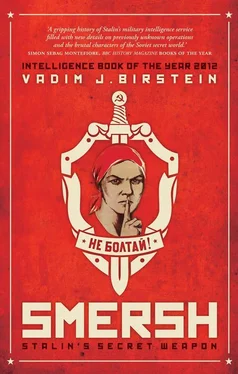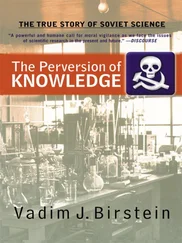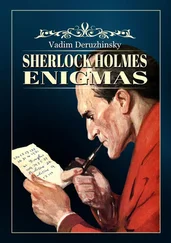Vadim J. Birstein
SMERSH
STALIN’S SECRET WEAPON
Ian Fleming purported in his first James Bond book, Casino Royale , published in April 1953, to report factually about SMERSH, described as part of the ‘MWD’, the successor to the NKVD, and headed by Lavrenti Beria. This particular passage is a curious overlap of error and accuracy, a confusion of the MGB, the Ministerstvo Gosudarstvennoy Bezopasnosti , being the Ministry of State Security, and the MVD, the Ministerstvo Vnutrennikh Del , which was the Soviet Ministry of Interior Affairs that had emerged from the old NKVD prior to the establishment of the KGB in 1954, following the death of Stalin the previous March, the same year that Casino Royale was published.
Fleming’s dossier, supposedly prepared by Section S to brief Bond’s Chief M, gives an account of SMERSH, an organization concerned, as he correctly mentioned, with counter intelligence and executions which really had existed between April 1943 and March 1946. Although SMERSH had been disbanded and absorbed in the MGB’s Third Main Directorate by the time Fleming wrote about it, very few outside of the international intelligence community had any knowledge of the agency which had been created by Stalin to liquidate counter revolutionaries and those suspected of collaboration with the Nazis.
That Fleming lacked any detailed understanding of the real SMERSH is suggested by his assertion that it had been responsible for the murder of Leon Trotsky in August 1940, at a time when it had not yet been created. In fact Trotsky’s assassination had been carried out by the NKVD, as is now well-documented, particularly by General Pavel Sudoplatov who had supervised the operation from Moscow, even if at the time the Kremlin publicly had professed innocence of the crime. Fleming’s mistake was entirely understandable because by April 1953 very little had been published openly about Soviet wartime or postwar intelligence activities. Indeed, the first book dedicated to the subject, David Dallin’s Soviet Espionage , would not be released in New York until 1955, so Fleming’s slightly inaccurate version almost certainly would have had to have come from official sources. Much information about the structure of Soviet intelligence and its activities would be revealed in 1954 upon the defections of Yuri Rastvorov, Piotr Deriabin, Nikolai Khokhlov and Evdokia and Vladimir Petrov, but when Fleming was writing Casino Royale, none of that was available. Certainly word had spread to Russian émigré communities, especially from postwar refugees, about SMERSH’s operations, but Fleming’s analysis, of only ‘a few hundred operatives of very high quality divided into five departments’, has a definite air of authenticity, as doubtless was intended. Although his breakdown of SMERSH’s five departments, being counter intelligence, operations, administration and finance, investigations and prosecutions, was not strictly accurate, it was close enough. In fact SMERSH was divided into five ‘administrations’, being personnel, operations, intelligence, investigations and prosecutions.
In 1953, when 007 first was introduced, there was a widespread perception that intelligence agencies routinely murdered their adversaries, and there was good reason for people to believe the worst. Particularly during the period of the quadripartite occupation of Germany and Austria, the Soviets became notorious for abducting their victims, never to be seen again. Although the existence of SMERSH was not widely acknowledged, just such an organization had existed during the latter part of World War II to eliminate collaborators who had acted for the Nazis in ‘stay-behind’ networks. Smersh, the Russian acronym for ‘death to spies’, consisted of killers trained by the NKVD who moved into newly-liberated areas directly behind the front-line troops to mop up enemy spy-rings. Their tactics were deadly but effective, and although SMERSH had been disbanded soon after the war, the Soviets retained a group of experienced assassins who were deployed overseas to liquidate opponents of the state. Details of the NKVD’s 9th Section would emerge through the testimony of Nikolai Khokhlov in February 1954 when he confessed to having been commissioned to shoot the Ukrainian nationalist leader, George Okolovich, in Frankfurt, with an ingenious cyanide gas-gun concealed inside a pack of cigarettes. Khokhlov’s shocking revelations, of state-sponsored, institutionalized assassination, were given widespread publicity, so Fleming’s adoption of SMERSH as a sinister adversary in his fiction is unsurprising.
Later, in the 1957 From Russia with Love , Fleming would insert an Author’s Note, insisting that SMERSH was still in existence, based at 13 Sretenka Ulitsa in Moscow, and employing 40,000 personnel. He claimed SMERSH was ‘the murder apparat of the MGB’, thereby introducing a further complication for between 1946 and 1953, the MGB had run the Soviet Union’s foreign intelligence operations.
In his Thunderball , published in March 1961, Fleming would acknowledge that SMERSH ‘had been disbanded on the orders of Khruschev [sic] in 1958’ but then, inexplicably, assert that it had been ‘replaced by the Special Executive Department of the MWD’, thus repeating his original error in Casino Royale which the author had corrected in From Russia with Love .
The first eye-witness account of SMERSH from the inside emerged in 1972 when Captain Boris Baklanov published his memoirs, The Nights Are Longest There , under the pseudonym A. I. Romanov. He had defected in Vienna in November 1947 and had been resettled in England as ‘Boris Haddon’ but news of the event was suppressed for more than two decades. In his autobiography Baklanov described how he had served in an NKVD demolition battalion during the war before attending an intelligence school in Babushkin and then being transferred to SMERSH.
Whether Fleming was granted access by the security authorities to Baklanov is unknown, but much of his information did come from privileged sources, as can be seen by his brief reference in From Russia with Love to Grigory Tokaev, a Soviet aeronautical expert and a GRU military intelligence officer who had sought political asylum in England in 1947. The author referred to Tokaev’s defection as a major setback for the Soviets, but in 1961 Tokaev, who had by then begun a new career as an academic in London and a rocket guidance system designer in Texas, was hardly a household name even if his Betrayal of an Ideal had attracted considerable attention when it had been promoted in 1954 with covert support from the Foreign Office’s propaganda branch.
During the Cold War denigration of the Kremlin’s policies was part of the West’s strategy, and both Baklanov and Tokaev were willing to collaborate by exposing SMERSH. Moscow continued to assassinate political opponents, as confirmed by two further defectors, Bogdan Stashinsky in 1961 and Oleg Lyalin in 1971. Indeed, the poisoning in November 2006 of Alexander Litvinenko in a London hotel with polonium-210, a rare radioactive compound, suggests that the topic of Russian governments resorting to extra-legal liquidation remains highly relevant more than two decades after the collapse of the Soviet bloc.
Accordingly, it would appear in retrospect that thanks to Fleming’s imagination, and his access to certain Soviet defectors, SMERSH became one of the world’s best-known, and notorious, intelligence agencies. However, the truth is even more remarkable.
Читать дальше













